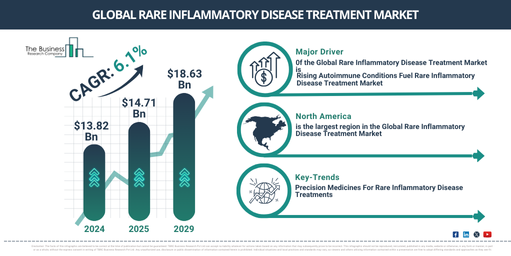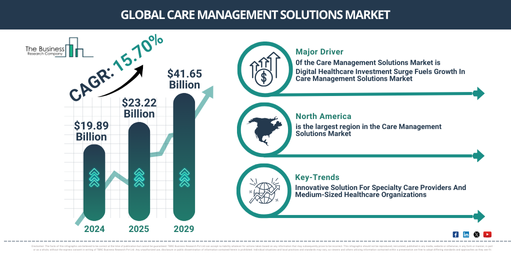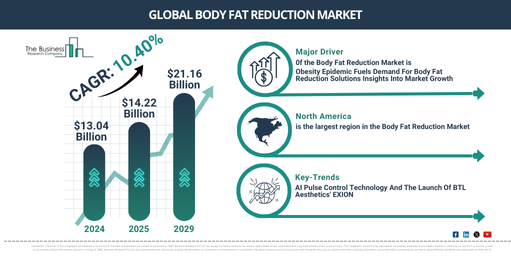What’s Driving Growth in the Rare Inflammatory Disease Treatment Market? Insights into Key Trends and Opportunities
Get 20% off on Global Market Reports until March 31st! Use code FY25SAVE at checkout.
How has the rare inflammatory disease treatment market grown in recent years?
Over the past few years, the market size for treatments of scarce inflammatory diseases has seen robust growth. This market will escalate from a value of $13.82 billion in 2024 to an impressive $14.71 billion in 2025 at a compound annual growth rate (CAGR) of 6.4%. This growth over time can be traced back to advancements in the field of immunology research, the introduction of targeted therapies, amplified recognition and prevalence of these diseases, expanded application of biological agents, and the formulation of rules governing orphan drugs.
How is the rare inflammatory disease treatment market size expected to evolve during the forecast period?
The rare inflammatory disease treatment market size is expected to see strong growth in the next few years. It will grow to $18.63 billion in 2029 at a compound annual growth rate (CAGR) of 6.1%. The growth in the forecast period can be attributed to accelerated drug development pipelines, growing investment in precision medicine, expanded access to advanced diagnostics, rising prevalence and diagnosis rates, and increasing patient advocacy and awareness efforts. Major trends in the forecast period include personalized treatment approaches, integration of digital health solutions, emphasis on patient-centered care, expansion of gene therapy options, and collaboration and data-sharing initiatives.
Get your rare inflammatory disease treatment market report here!
Which key drivers are propelling the rare inflammatory disease treatment market’s growth?
The escalating occurrence of autoimmune disorders is projected to boost the progress of the rare inflammatory disease treatment market. Autoimmune diseases are when the immune system mistakenly assaults healthy cells and tissues, which then causes inflammation and tissue damage. The surge in these conditions is due to genetic vulnerability, environmental influences, changes in lifestyle, and enhanced diagnostic techniques leading to improved identification and awareness of these diseases. Treatments for rare inflammatory diseases are frequently employed to reduce inflammation and halt the immune system’s attacks on healthy tissues in those suffering from autoimmune diseases. For instance, in June 2024, the Australian Institute of Health and Welfare, a government-based organization in Australia, stated that rheumatoid arthritis is a systemic autoimmune disorder where the body’s immune system attacks its own tissues. In 2022, about 514,000 people (2.0%) in Australia were living with this disease, with 2.5% of them being females and 1.6% being males. Also, in November 2022, according to Health Match, an Australian digital health firm, there are approximately 150 rare kidney diseases, and these disorders have a high occurrence globally, with 60-80 cases per 100,000 people in America and Europe. Consequently, the escalating occurrence of autoimmune diseases is stimulating the expansion of the rare inflammatory disease treatment market.
What are the market segments in the rare inflammatory disease treatment industry?
The rare inflammatory disease treatment market covered in this report is segmented –
1) By Drug Class: Biologics, Organic Compounds
2) By Mode Of Administration: Injectables, Oral, Other Administration Modes
3) By Indication: Ulcerative Colitis, Juvenile Rheumatoid Arthritis, Psoriatic Arthritis, Other Indications
4) By Distribution Channel: Hospital Pharmacies, Retail Pharmacies, Online Pharmacies
Subsegments:
1) By Biologics: Monoclonal Antibodies, Cytokine Inhibitors, Growth Factors, Enzyme Replacement Therapies
2) By Organic Compounds: Non-Steroidal Anti-Inflammatory Drugs (Nsaids), Immunosuppressants, Corticosteroids, Disease-Modifying Antirheumatic Drugs (Dmards)
Get your free sample now – explore exclusive market insights:
https://www.thebusinessresearchcompany.com/sample.aspx?id=15656&type=smp
Who are the dominant players expanding their reach in the rare inflammatory disease treatment market?
Major companies operating in the rare inflammatory disease treatment market are Pfizer Inc., Johnson & Johnson, Roche Holding AG, Merck & Co., Inc., AbbVie Inc., Bayer AG, Sanofi S.A., Bristol Myers Squibb, AstraZeneca Plc, Novartis AG, GlaxoSmithKline plc, Eli Lilly and Company, Gilead Sciences, Inc., Amgen Inc., Regeneron Pharmaceuticals, Inc., Biogen Inc., UCB S.A., Jazz Pharmaceuticals plc, Horizon Therapeutics plc, Kyowa Kirin Co., Ltd., BioMarin Pharmaceutical Inc., Mallinckrodt Pharmaceuticals, Sarepta Therapeutics, Inc., Cytokinetics, Incorporated, Orchard Therapeutics plc
What key trends are currently impacting the rare inflammatory disease treatment market’s development?
Leading firms in the treatment of rare inflammatory diseases are striving to develop sophisticated precision medicines like monoclonal antibodies to specifically target parts of the immune system and secure an advantage in the market. The role of monoclonal antibodies is crucial in rare inflammatory disease treatment as they target specific pathways to ease symptoms and enhance outcomes. For example, in January 2022, the Germany-based pharmaceutical company Boehringer Ingelheim got the U.S. Food and Drug Administration (FDA) approval for SPEVIGO, a monoclonal antibody that inhibits the signalling of interleukin-36 (IL-36), making it the first and only approved drug for the treatment of GPP in adults and adolescents over 12 years old who weigh at least 88 pounds (40 kg). SPEVIGO acts as a targeted treatment designed to suppress the activity of the interleukin-36 receptor (IL-36R), a crucial component in a signaling pathway within the immune system involved in generalized pustular psoriasis flares.
Unlock exclusive market insights – purchase your research report now for a swift delivery!
https://www.thebusinessresearchcompany.com/purchaseoptions.aspx?id=15656
What regions are contributing significantly to the growth of the rare inflammatory disease treatment market?
North America was the largest region in the rare inflammatory disease treatment market in 2024. Asia-Pacific is expected to be the fastest-growing region in the forecast period. The regions covered in the rare inflammatory disease treatment market report are Asia-Pacific, Western Europe, Eastern Europe, North America, South America, Middle East, Africa.
Browse Through More Similar Reports By The Business Research Company:
Crohn’s Disease Treatment Global Market Report 2024
https://www.thebusinessresearchcompany.com/report/crohns-disease-treatment-global-market-report
Anti-Inflammatory Therapeutics Global Market Report 2024
Non-Steroidal Anti-inflammatory Drugs Global Market Report 2024
About The Business Research Company:
With over 15000+ reports from 27 industries covering 60+ geographies, The Business Research Company has built a reputation for offering comprehensive, data-rich research and insights. Armed with 1,500,000 datasets, the optimistic contribution of in-depth secondary research, and unique insights from industry leaders, you can get the information you need to stay ahead in the game.
Contact us at:
The Business Research Company: https://www.thebusinessresearchcompany.com/
Americas +1 3156230293
Asia +44 2071930708
Europe +44 2071930708
Email us at [email protected]
Follow us on:
LinkedIn: https://in.linkedin.com/company/the-business-research-company
YouTube: https://www.youtube.com/channel/UC24_fI0rV8cR5DxlCpgmyFQ
Global Market Model: https://www.thebusinessresearchcompany.com/global-market-model
Found this article helpful? Share it on:



